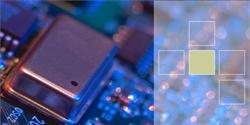
Welcome to
Azur Electronics
Azur Electronics
Home
Projects
Test Equipment
- Accessories
- Adaptors
- Amplifiers
- Attenuators
- Cables
- Frequency Counters
- Logic Analysers
- Multi-Meters
- Network Analysers
- Oscilloscopes
- Power Meters
- Power Supplies
- Prototyping Equipment
- Signal Generators
- Spectrum Analysers
- Tools
Operating Information
- Operating HP 141T
- Operating HP 1630D
- Operating HP 8175A
- Operating HP 8407A
- Operating HP 8410C
- Operating HP 8552B IF Section
- Operating HP 8553B RF Section
- Operating HP 8554B RF Section
- Operating HP 8555A RF Section
- Operating HP 8556A LF Section
- Operating HP 8594E Spectrum Analyser
- Operating HP 8901B
- Operating LeCroy 9310
Technical
- Allen Key Sizes
- High Voltage Measurement
- HP Cases
- HP Information
- HP-IB Interface Bus
- Measurement Units
- Motorola ECL
- RF Connectors
- RF Power - Voltage Conversion
For Sale
Wanted
Links
About Me
Contact Me
Site Map
OPERATING HP 8554B
RF SECTION
RF SECTION
CALIBRATION
Before the Spectrum Analyser can be used, it must be calibrated using the following procedure. This sets the HP 8552B IF Section X & Y gain & position and the HP 8554B RF Section amplitude calibration.
[Based on HP 8552B & 8554B Operating and Service Manuals]
Before the Spectrum Analyser can be used, it must be calibrated using the following procedure. This sets the HP 8552B IF Section X & Y gain & position and the HP 8554B RF Section amplitude calibration.
[Based on HP 8552B & 8554B Operating and Service Manuals]
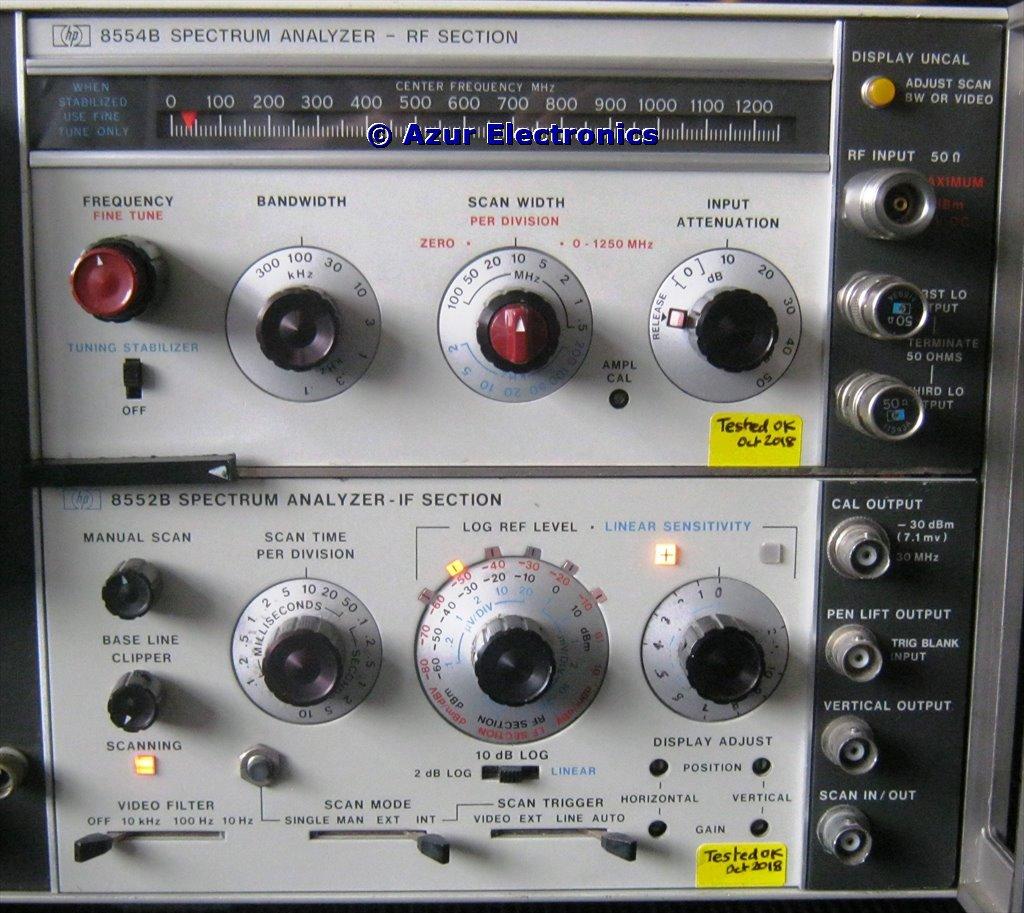
NOTE: Ensure the 8552B / 8554B D-type connectors are correctly mated. Poor mating is often the cause of X & Y display problems! A quick check is to ensure that switching the INPUT ATTENUATION lights all the lamps around the LOG REF LEVEL control.
1. Initial Setup
Switch the HP 141T Display Section LINE ON.
Press NON STORAGE mode CONV button.
Intensity to 12 o’clock approx.
Focus to 12 o’clock approx.
Allow to warm up for 30 minutes approx.
Set 8554B Controls as follows:
FREQUENCY 30MHz
FINE TUNE Centred
BANDWIDTH 100kHz
SCAN WIDTH PER DIVISION
PER DIVISION 10MHz
INPUT ATTENUATION 10dB
TUNING STABILIZER On
Terminate in 50Ω the FIRST LO OUTPUT and THIRD LO OUTPUT.
Set 8552B Controls as follows:
MANUAL SCAN Centred
BASELINE CLIPPER CCW
SCAN TIME PER DIVISION 10ms
LOG REF LEVEL -30dBm
LOG REF LEVEL Vernier 0
LOG LINEAR 10dB LOG
VIDEO FILTER OFF
SCAN MODE INT
SCAN TRIGGER AUTO
2. Focus and Astigmatism
Adjust INTENSITY as needed.
Set LOG REF LEVEL maximum CCW (this minimises noise on the baseline).
Adjust VERTICAL POSITION to set the trace to the -50dB graticule line.
Set SCAN TIME PER DIVISION to 10s.
Adjust FOCUS and ASTIG for the smallest round dot possible.
3. Trace Alignment
Set SCAN TIME PER DIVISION to 10ms.
Adjust TRACE ALIGN to set the trace parallel to the horizontal graticule line.
4. Horizontal Position and Gain
Adjust HORIZONTAL POSITION so the display is centred on the CRT.
Adjust HORIZONTAL GAIN so the displayed scan width is exactly 10 divisions on the CRT.
Some interaction between HORIZONTAL POSITION and GAIN controls may require readjustment.
1. Initial Setup
Switch the HP 141T Display Section LINE ON.
Press NON STORAGE mode CONV button.
Intensity to 12 o’clock approx.
Focus to 12 o’clock approx.
Allow to warm up for 30 minutes approx.
Set 8554B Controls as follows:
FREQUENCY 30MHz
FINE TUNE Centred
BANDWIDTH 100kHz
SCAN WIDTH PER DIVISION
PER DIVISION 10MHz
INPUT ATTENUATION 10dB
TUNING STABILIZER On
Terminate in 50Ω the FIRST LO OUTPUT and THIRD LO OUTPUT.
Set 8552B Controls as follows:
MANUAL SCAN Centred
BASELINE CLIPPER CCW
SCAN TIME PER DIVISION 10ms
LOG REF LEVEL -30dBm
LOG REF LEVEL Vernier 0
LOG LINEAR 10dB LOG
VIDEO FILTER OFF
SCAN MODE INT
SCAN TRIGGER AUTO
2. Focus and Astigmatism
Adjust INTENSITY as needed.
Set LOG REF LEVEL maximum CCW (this minimises noise on the baseline).
Adjust VERTICAL POSITION to set the trace to the -50dB graticule line.
Set SCAN TIME PER DIVISION to 10s.
Adjust FOCUS and ASTIG for the smallest round dot possible.
3. Trace Alignment
Set SCAN TIME PER DIVISION to 10ms.
Adjust TRACE ALIGN to set the trace parallel to the horizontal graticule line.
4. Horizontal Position and Gain
Adjust HORIZONTAL POSITION so the display is centred on the CRT.
Adjust HORIZONTAL GAIN so the displayed scan width is exactly 10 divisions on the CRT.
Some interaction between HORIZONTAL POSITION and GAIN controls may require readjustment.
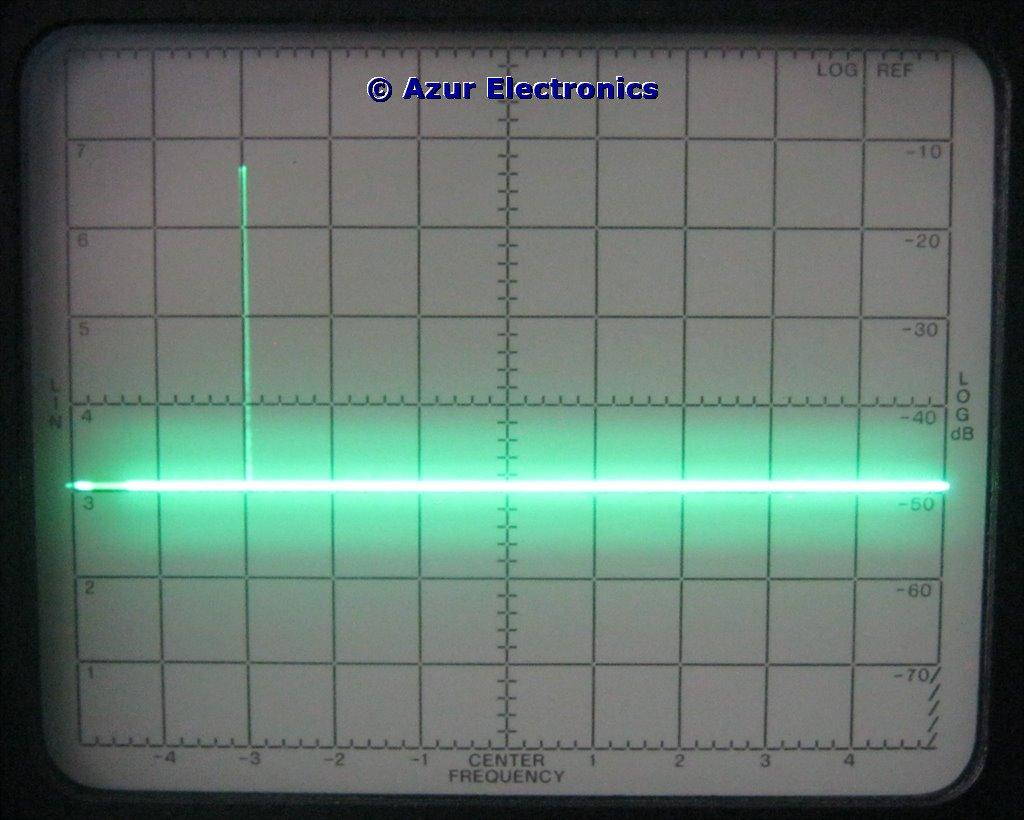
Display shows horizontal line at -50dBm graticule line and
1st L.O. feed through at 0MHz (centre position is 30MHz)
1st L.O. feed through at 0MHz (centre position is 30MHz)
5. Vertical Position and Gain
Adjust VERTICAL POSITION to set the trace to the -80dB graticule line.
Set LOG REF LEVEL to 0dBm.
Set FREQUENCY to 50MHz.
Connect 8552B CAL OUTPUT to 8553B RF INPUT using a BNC to BNC 50Ω coax cable and a N-type to BNC Adaptor.
Adjust VERTICAL POSITION to set the trace to the -80dB graticule line.
Set LOG REF LEVEL to 0dBm.
Set FREQUENCY to 50MHz.
Connect 8552B CAL OUTPUT to 8553B RF INPUT using a BNC to BNC 50Ω coax cable and a N-type to BNC Adaptor.
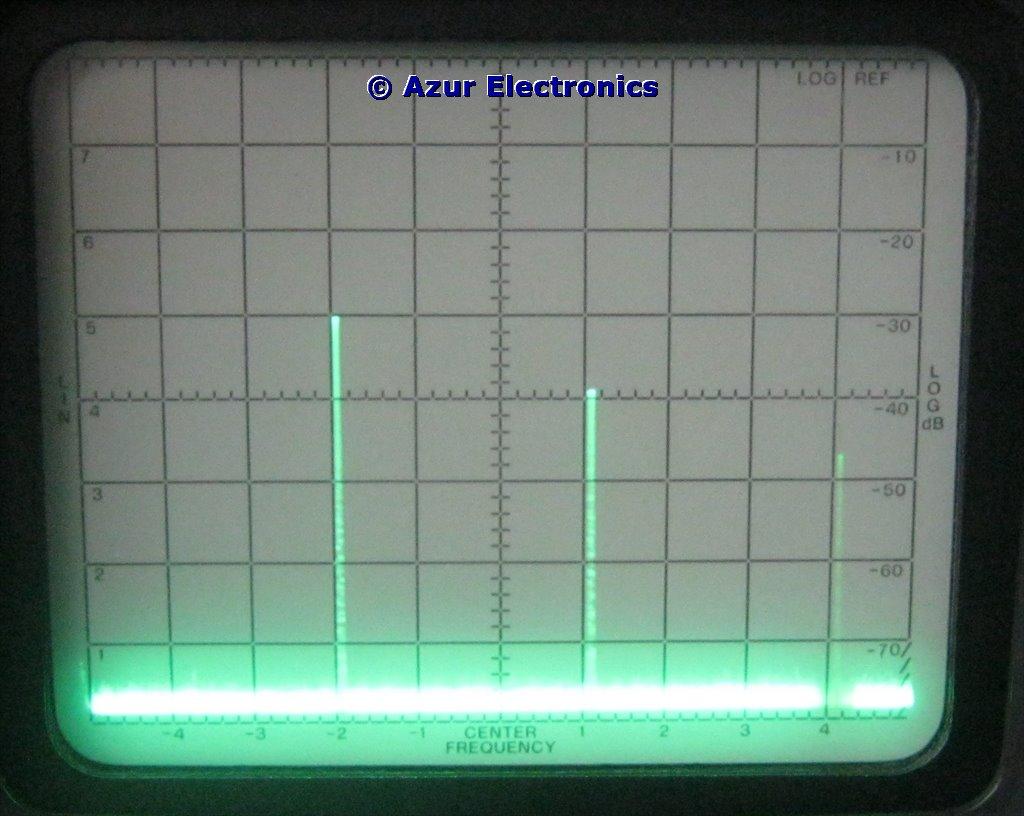
Display shows horizontal line at -80dBm graticule line and
Calibration signal at 30MHz and -30dBm
2nd harmonic at 60MHz and -40dBm approx
3rd harmonic at 90MHz and -45dBm approx
Calibration signal at 30MHz and -30dBm
2nd harmonic at 60MHz and -40dBm approx
3rd harmonic at 90MHz and -45dBm approx
Set SCAN WIDTH to 0 - 1250MHz.
The inverted marker below the horizontal base line indicates the centre frequency of the SCAN WIDTH – PER DIVISION and ZERO tuning modes.
Adjust FREQUENCY to place the marker under the Calibration Signal at 30MHz and achieve maximum null.
The inverted marker below the horizontal base line indicates the centre frequency of the SCAN WIDTH – PER DIVISION and ZERO tuning modes.
Adjust FREQUENCY to place the marker under the Calibration Signal at 30MHz and achieve maximum null.
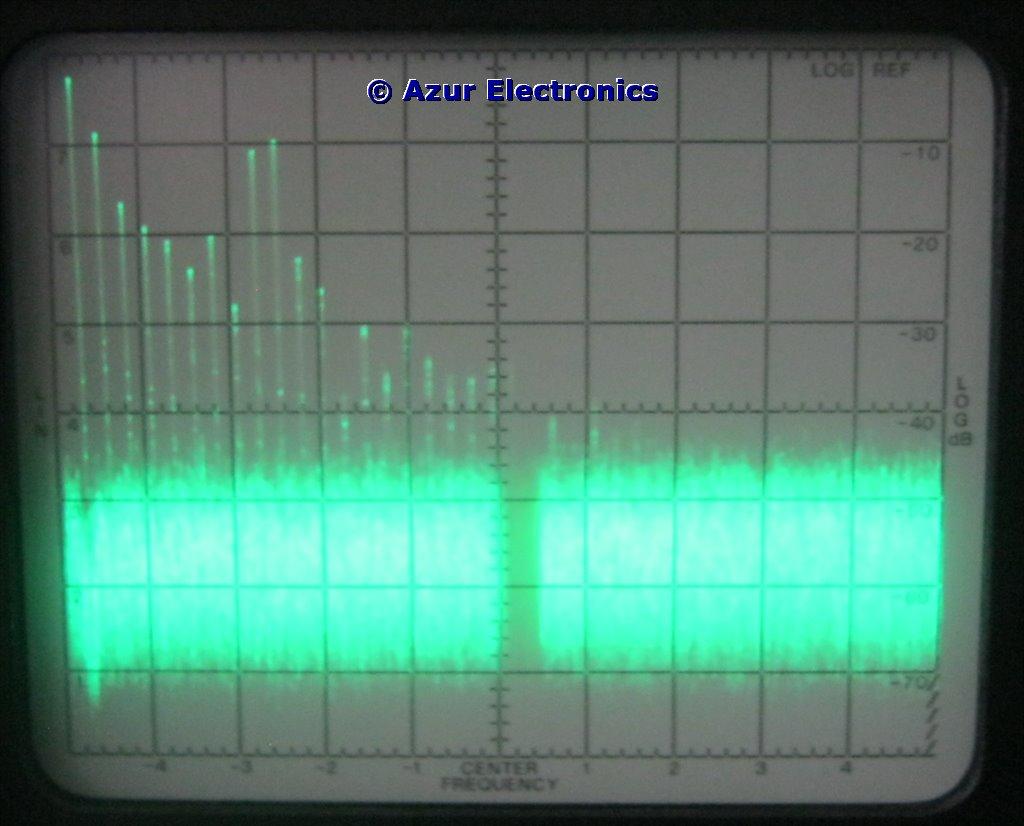
Display shows Calibration signal at 30MHz
with harmonics to 1,250MHz
and marker under 30MHz position
Note noise on baseline
with harmonics to 1,250MHz
and marker under 30MHz position
Note noise on baseline
Set SCAN WIDTH to PER DIVISION.
Adjust FREQUENCY to centre the 30 MHz signal on the CRT.
Reduce SCAN WIDTH PER DIVISION to .5MHz.
Adjust FREQUENCY FINE TUNE to keep signal centred.
Set LOG REF LEVEL maximum CCW.
Adjust LOG REF LEVEL and VERNIER so maximum signal amplitude is exactly on -70dBm graticule line.
Rotate LOG REF LEVEL 7 steps clockwise. The amplitude of the signal should increase one vertical division per 10dB step.
Adjust VERTICAL GAIN to place maximum signal amplitude exactly on the top graticule line.
Repeat the previous 3 steps to obtain optimum setting.
Adjust FREQUENCY to centre the 30 MHz signal on the CRT.
Reduce SCAN WIDTH PER DIVISION to .5MHz.
Adjust FREQUENCY FINE TUNE to keep signal centred.
Set LOG REF LEVEL maximum CCW.
Adjust LOG REF LEVEL and VERNIER so maximum signal amplitude is exactly on -70dBm graticule line.
Rotate LOG REF LEVEL 7 steps clockwise. The amplitude of the signal should increase one vertical division per 10dB step.
Adjust VERTICAL GAIN to place maximum signal amplitude exactly on the top graticule line.
Repeat the previous 3 steps to obtain optimum setting.
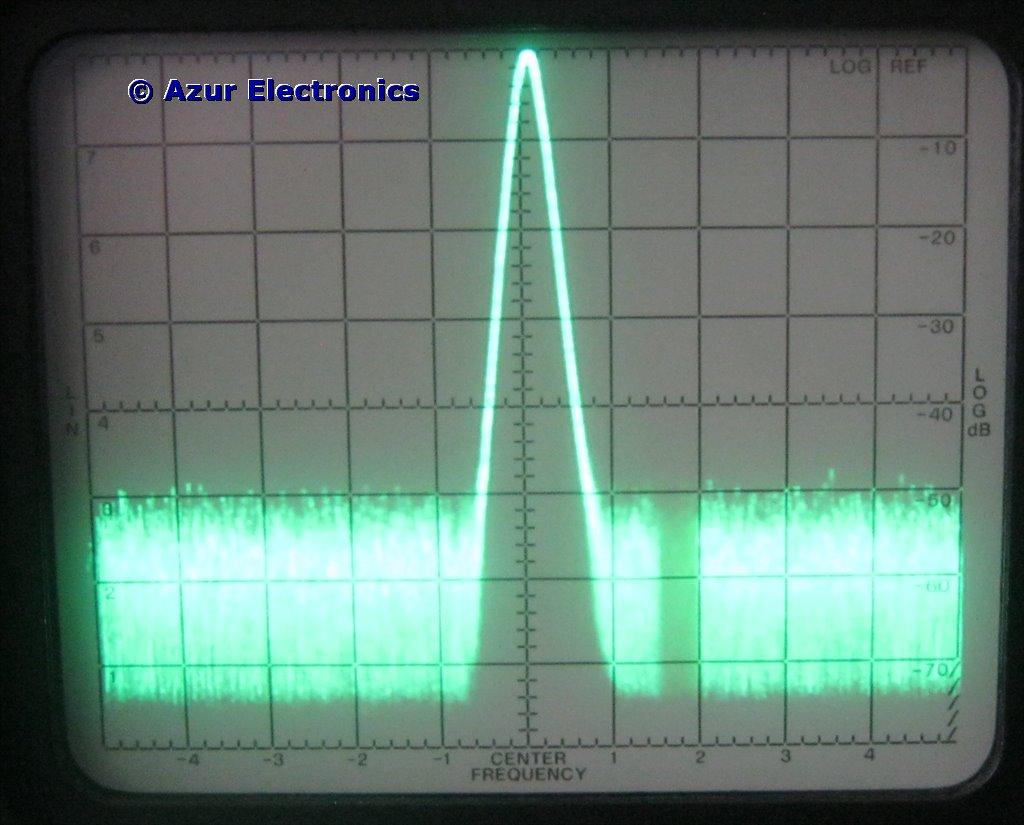
Display shows Calibration signal at 30MHz
Note noise on baseline
Note noise on baseline
6. Amplitude Calibration
Set LOG REF LEVEL to -30dBm.
Adjust AMPL CAL to place maximum signal amplitude exactly on the top graticule line.
The Spectrum Analyser is now calibrated in the LOG display mode from -130dBm to +10dBm.
7. Linear Mode
Set LOG REF LEVEL to 1mV/DIV on blue scale.
Set the LOG – LINEAR switch to LINEAR.
Set LINEAR SENSITIVITY to 1mV on blue scale (Vernier 0 position).
Set LOG REF LEVEL to -30dBm.
Adjust AMPL CAL to place maximum signal amplitude exactly on the top graticule line.
The Spectrum Analyser is now calibrated in the LOG display mode from -130dBm to +10dBm.
7. Linear Mode
Set LOG REF LEVEL to 1mV/DIV on blue scale.
Set the LOG – LINEAR switch to LINEAR.
Set LINEAR SENSITIVITY to 1mV on blue scale (Vernier 0 position).
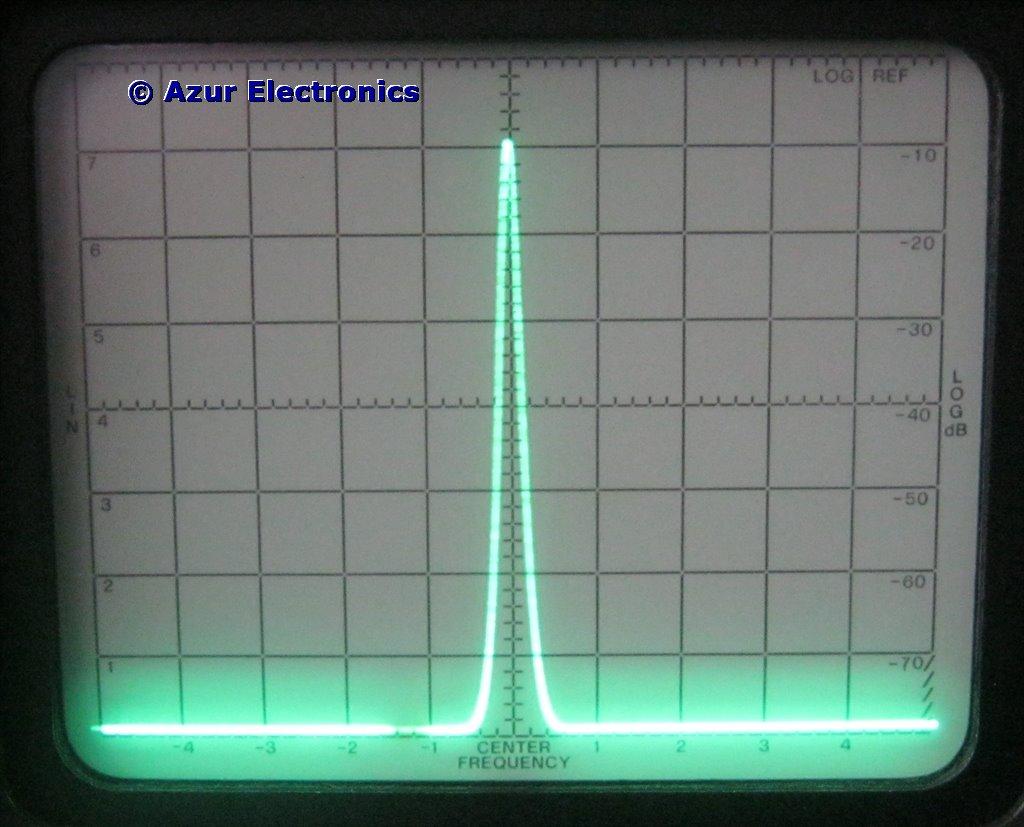
Display showing the 30MHz calibration signal at 7.1mV
The left hand side vertical graduations 0 to 8 are calibrated in absolute voltage.
Maximum signal amplitude should be 7.1mV (-30dBm is 7.07mV across 50Ω), if necessary adjust AMPL CAL to achieve this.
The Spectrum Analyser is now calibrated in the LINEAR display mode from 0.1µV to 100mV.
8. Reset
Return the 8552B and 8553B controls to their starting position.
NOTE: For safe operation, maximum RF Input level is +10dBm, 10mW, ±50Vdc. To avoid damage to the Mixer, initially utilise maximum input attenuation and/or an external attenuator!
Maximum signal amplitude should be 7.1mV (-30dBm is 7.07mV across 50Ω), if necessary adjust AMPL CAL to achieve this.
The Spectrum Analyser is now calibrated in the LINEAR display mode from 0.1µV to 100mV.
8. Reset
Return the 8552B and 8553B controls to their starting position.
NOTE: For safe operation, maximum RF Input level is +10dBm, 10mW, ±50Vdc. To avoid damage to the Mixer, initially utilise maximum input attenuation and/or an external attenuator!
August 2019
Have now sold all my 141T based equipment.
Have now sold all my 141T based equipment.